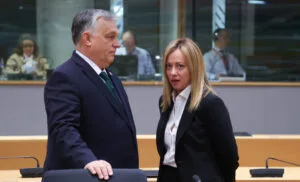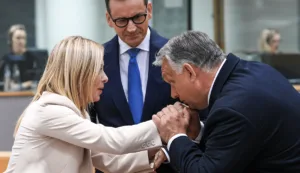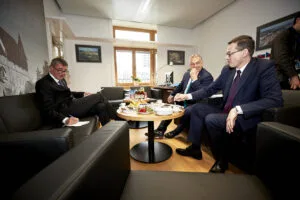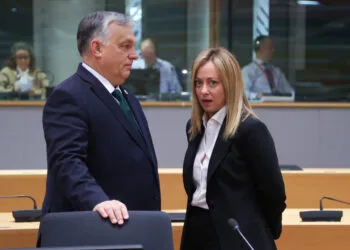Brussels – It was supposed to be a united camp to become “the second largest group in the European Parliament.” It was supposed to be an overwhelming “force for Europe” that would change the balance in Brussels, capable of “reshaping the configuration of the European right, or even supplanting the European People’s Party.” Instead, the not-so-irresistible rise of conservative, nationalist, sovereignist, and extreme right-wing parties in the June 6-9 European elections is turning into a huge soap bubble, leaving an even more divided and quarrelsome camp on the ground, which is not touching the ball and splits up at the European Council and – instead of uniting – divides into even more pieces at the EU Parliament.

If want things to stay as they are, things will have to change, wrote Giuseppe Tomasi di Lampedusa in 1958. More than sixty years later, the European right, despite itself, has taken doctrine and made it almost a verdict: almost everything is ready to change (internally), but almost everything will remain as before (externally). Because the European Council late last night (June 27) appointed the new heads of the EU institutions, who are then expressions of a well-known Union: the Popular from Germany Ursula von der Leyen for a second term at the European Commission, the Liberal Prime Minister of Estonia, Kaja Kallas as EU High Representative for Foreign Affairs and Security Policy, and the Socialist former Prime Minister of Portugal, António Costa, at the European Council.
At the heads of state and government table, leaders who would have liked to tip the balance among the Twenty-seven were left on the sidelines and did not even vote compactly. The Italian premier and President of the European Conservatives and Reformists Party, Giorgia Meloni, aware of having no leeway at the European Council table, was the only leader who did not vote in favor of any of the three candidates (only on von der Leyen did she abstain). The Hungarian colleague Viktor Orbán, who said the words at the beginning of the article, was first outraged as “this agreement is a disgrace and not based on the election result,” but then endorsed Costa and abstained on Kallas. The base was the agreement of the negotiators from the Populars, Socialists, and Liberals – who decided and will continue to decide the fate of the Union – and all the other leaders went along, regardless of the color of the government they represent. While it is still true that the far right has already entered, or decisively supports, governments in seven member countries, at the first opportunity it had to make an impact in Brussels, it failed to turn claims for a “Europe of nations” into names of breaking with the past. Or even to hold a common line.
The European Right in the EU Parliament
If possible, the speech in the European Parliament shows even more clearly how the European right is in a tailspin. With the wrecking of the project to create a single camp with a mega-group comprising the European Conservatives and Reformists (ECR) and Identity and Democracy – really never really a credible option – after the European elections, the two camps immediately began to reorganize in Brussels without opening tables of dialogue, on the contrary, squabbling over members and causing immediate frictions between national parties over opposing nationalisms. An example of this was the ruling Hungarian Fidesz party, whose 10 MEPs with no affiliation closed the door on entry into the ECR group – despite months of political flirtation between Orbán and Meloni – because of the previous membership of five new members of the ultranationalist Romanian Alliance for the Union of Romanians (AUR) party. Or, the rift within the French ultranationalist far-right of Reconquête over skirmishes on the relationship with the far-right of Rassemblement National ahead of early elections in the country: after the expulsion of four of the five elected MEPs (now ready to found a new formation, but in the meantime already part of ECR) is left with only one representative, who still does not know in which group she will end up.

There is time until Thursday (July 4) to formal new political groups in the European Parliament. These are hectic days in Brussels because of the turmoil created by different rumors about the emergence of new formations that, if they go through, will fragment the European right-wing camp even more. After days of behind-the-scenes activity, the project of the new group “The Sovereignists” led by Germany’s radical right-wing Alternative für Deutschland party, which has been strengthened in Brussels with 15 members, but is suffering because of its expulsion from the ID group over statements made by its leading candidate, Maximilian Krah who failed to condemn the past Nazi special forces SS. So now it is looking for a solution not to be relegated to political irrelevance in the non-attached group. No fewer than 23 MEPs from at least a quarter of the member states (seven) are needed to form a new parliamentary group, and a host of small and micro-extremist parties could join AfD: from the pro-Russian, anti-European Bulgarians of Vazrazhdane (‘Rebirth’) to the Polish populist ultra-right of Konfederacja, to the Spanish populist movement Se Acabó La Fiesta (‘The Party is Over’), the Greek national-conservatives of Democratic Patriotic Movement – Victory (Nikh), the Romanian irredentists of S.O.S. Romania and the Hungarian Our Fatherland Movement, and the Slovak neo-fascists of Republika.
Then there is the real bombshell that could burst at any moment in the European right-wing camp, which has the potential to blow up the sovereignist entente between Meloni, Orbán, and the Polish Law and Justice (PiS) of former PM Mateusz Morawiecki. The Hungarian PM’s decision to permanently close off the prospect of joining the same party group as his Italian counterpart – to whom he always addresses honeyed words – immediately seemed suspicious, particularly given the concomitant exit from the Renew Europe group of the Czech populist liberal-conservative ANO 2011 party of former PM Andrej Babiš. Both leaders have been talking for days about a new group in the European Parliament that would represent the countries of the Visegrád Group – Hungary, the Czech Republic, Slovakia, and Poland – and beyond, but which would immediately collide not only with that potential new group of Sovereignists (for the search of members) but especially with the ECR group for the fragile balances between nationalisms.

Because the big fish for Orbán is precisely Meloni’s closest ally in the conservative European right-wing group: Morawiecki’s PiS, which yesterday opened to the possibility of exiting the ECR but today took it back, saying that he was ready to resume dialogue with the Italians on the distribution of posts in the group after the postponement of the constituent meeting on June 26. In fact, between Hungarians and Poles, there is a strong political division point: the relationship with Putin’s Russia. It is hard to imagine, but if overcome in the name of the traditional “let’s be in the same group but vote each according to his or her own choices,” together with Hungarians (10), Poles (20), and Czechs (7) — with other additions needed for the seven-country rule — would go on to build a more substantial force than the Left Group (39 members). More importantly, they would empty the ECR by relegating it to fourth place with 63 members and jumping to third place among parliamentary groups in vain at the expense of the Liberals of Renew Europe (75). As for the fourth member, the Visegrád Group, Slovak diplomatic sources told Eunews that there is no interest at the moment and that the only option on the table for the two red-brown parties SMER-SSD (of Premier Robert Fico) and HLAS-SD (of President Peter Pellegrini) is a possibly impossible reunion with the Social Democratic family after the last being suspended last fall due to the emergence of the government with the extreme nationalist right. The same sources indicate that “there are other parties without affiliation,” i.e., those of Republika neo-fascists contested by the AfD ‘Sovereignists.’ In short, it was supposed to be “the second group in the European Parliament” to change the balance of the Union. Instead, the European right is in danger of splintering and quarreling even more internally, while outside – where decisions are made – everything remains as it has always been.
English version by the Translation Service of Withub









